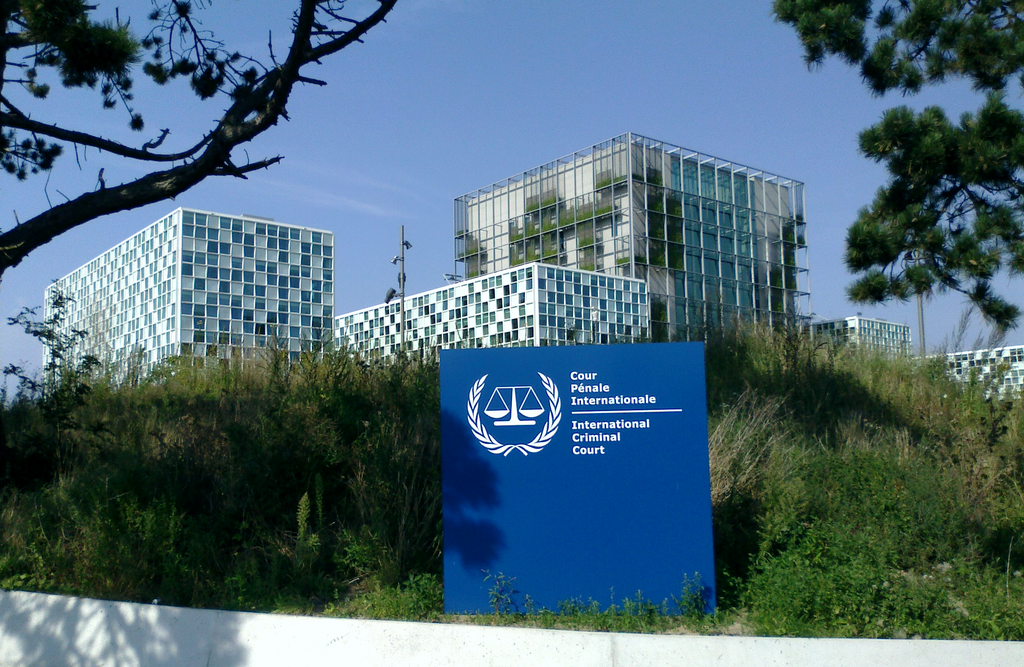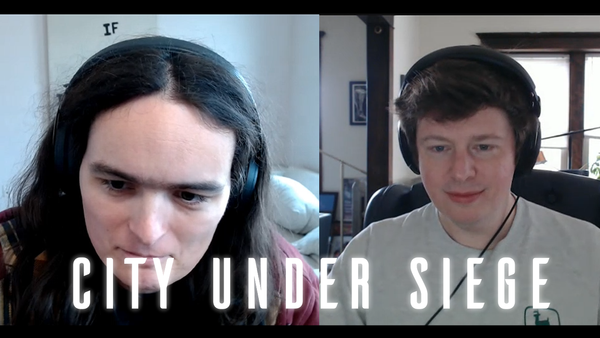A Fight Against Impunity: Cooperation in the International Criminal Court
The ICC as a body has important potential for advancing international justice and deserves more extensive support.

Despite the cries of “Never again” following the Second World War and the Holocaust, it wasn’t until the 1990s—with the end of the Cold War and the expansion of international television news—that a dedicated body was set up to deal with individual war criminals in a consistent and lawful way. During the 1990s, the two genocides in Rwanda and Bosnia occurred with little international intervention, but in the wake of these international failures, the global community was in search of some method of justice to address such atrocities. The body that was created in the wake of these tragedies, the International Criminal Court, has taken a higher profile—and more controversial—role in international politics over the past three years, indicting multiple heads of state including Vladimir Putin and Benjamin Netanyahu as well as high-ranking military leaders like Hamas commander Mohammad Deif and Israeli Defense Minister Yoav Gollant. In another milestone, in early March of this year the ICC took into custody former Philippines president Rodrigo Duterte. These high profile cases have brought more international media attention to the Court—but also raise questions about its capacity and increase the salience of critiques against the court.
There are several serious criticisms of the Court, both academic and political. Like many bodies connected to the UN, the ICC differs from court systems within states in that it does not include a police force, placing a high premium on state sovereignty. Like all collective action problems, when dealing with international law there is some possibility that states will “defect”—accept some benefits of the organization without contributing to its goals when their own time comes to make a sacrifice or bear a cost. With no formal enforcement structure, a major question (asked by both critics and researchers), how does the International Criminal Court promote cooperation and compliance? There is a common view that a court without a military or police force is untenable and ineffective. The assumption in this view is that states require some form of forceful incentives and deterrence to drive cooperation because they do not want their citizens prosecuted—thus without enforcement, there is an incentive to defect. Some researchers such as Julian Ku and Jide Nzelibe are skeptical as to whether the court has influence over preventing war crimes given their lack of formal enforcement capabilities to conduct arrests. They argue against the idea that organizations like the ICC end a culture of impunity, claiming that “prosecutions will be unlikely to have any meaningful deterrence effect”1 because the court faces severe constraints in executing its decisions and it prosecutes very few cases.
Political figures also argue that any moral incentive undermines state sovereignty and few states would be willing to give up that right. During the first term of his presidency, Donald Trump demonstrated what Human Rights Watch called “contempt for the Global Rule of Law” with sanctions and bans against members of the ICC2. His views aligned with ongoing American policy towards the institution since its conception. The American government not only seeks protection against prosecution of its citizens—and those of its Israeli ally—but also sees the court as a threat to sovereignty, and has passed sanctions against the court and its personnel. Associated Press News reported “Staffers and allies of the ICC said the sanctions have made it increasingly difficult for the tribunal to conduct basic tasks, let alone seek justice for victims of war crimes or genocide.”3 These sanctions have significantly inhibited the court's ability to communicate and collaborate with partner organizations. As a result “ Six senior officials have left the court over concerns about sanctions.” The departure of key personnel demonstrates the severe impact from political pressure, highlighting how U.S. influence can destabilize ICC operations and undermine broader efforts to uphold international justice.
These critiques aren’t trivial, and the challenges facing the Court are myriad. However, examining its history and place in the international system reveals that, despite its limitations, the ICC as a body has important potential for advancing international justice and deserves more extensive support.
The International Criminal Court—why it was created and how it works
Prior to the development of the ICC, there were already rules and norms regarding war crimes and other crimes against humanity, but there were no permanent institutions to legally enforce them. From the Nuremberg Trials after World War II to the International Criminal Tribunal for Rwanda, atrocities were generally dealt with in an ad hoc manner after the fact, with little consistency. In response to such situations, the Rome Statute of the International Criminal Court was implemented in 1998. The statute outlined how the court would manage and conduct international law against war criminals and others accused of these crimes: “The mandate of the Court is to try individuals (rather than States), and to hold such persons accountable for the most serious crimes of concern to the international community as a whole, namely the crime of genocide, war crimes, crimes against humanity, and the crime of aggression.”4
The ICC is unique as it was founded out of a treaty rather than as a body of the UN. Despite working closely with the UN, the ICC remains independent. This independence allows it to follow its own charter and judgment without a veto granted to any country. The jurisdiction of the court typically only covers countries that accept its mandate; under Chapter 7 of the UN charter, an individual can be tried if they are referred to the Court by the UN.5 The ICC is also a court of last resort, meaning they only try crimes in the event that a country is unable or unwilling to do so themselves, and typically only claims jurisdiction over crimes committed in states that have acceded to the Rome Statute or who have otherwise granted jurisdiction to the ICC.
How does the ICC attempt to change the behavior of the member states
The ideal functioning of the ICC is as a positive sum game where all signatories benefit (at the expense of individual criminals). Successful ICC enforcement means that individual criminals will be held accountable for violations, benefiting all nations in the system by deterring future crimes. Given that such crimes not only undermine international law but also have a tendency to destabilize the country hosting the criminals, removing such threats can benefit all the countries involved. The organization focuses on the distribution of responsibility, and defecting is no longer a more attractive offer than cooperating. Both first- and second-party enforcement are used to manage this cooperation effectively.
Once member states accept the jurisdiction of the ICC, states are incentivized to comply through more first-party forms of enforcement—that is, enforcement by member state governments themselves—that are influenced by internalized moral norms that promote cooperation. These norms allow the ICC to use the member states’ own citizens as tools for enforcement. Indeed, in most cases, ICC indictees are arrested and handed over by their own countries.
When nations enter institutional agreements that deal with multilateral political issues such as security, scholars Abram and Antonia Handler Chayes claim “they alter their behavior, their relationships, and their expectations of one another over time in accordance with its terms. That is, they will to some extent comply with the undertakings they have made.”6 The consistency of the court also facilitates the development of long term norms and provides benefits from reciprocal expectations. For example, countries bordering Russia that have a vested interest in seeing the ICC used against Russian war criminals may find it necessary to comply with ICC instructions regarding other indictments.
One weakness of the court is that some of the largest nations are not members—China, India, the USA, and Russia. For such powers, protecting sovereignty is favored over fighting impunity. But for the ICC members, which now number over 100, there are several benefits from joining. For one, they gain some say over how the organization operates by helping choose the 18 judges who serve with the ICC. Another incentive for members is that states whose citizens are more likely to be victims than perpetrators of war crimes is that they may see a benefit to participating specifically because that state can be a part of condemning an adversary state. Ukraine and the Palestinian Authority, for example, have, by accepting ICC jurisdiction over their territories, been able to add to the weight of ICC indictment to the accusations of war crimes that they have made against non-members Russia and Israel.
How successful is the ICC?
From its inception, the International Criminal Court has strived to enforce accountability and prevention of immoral violations and criminal offenses. In its first 21 years of operation, the ICC has heard 31 cases including 10 convictions and 4 acquittals.7 In addition to these prosecutorial successes in the Hague, the presence of an international court has helped impel a culture against impunity abroad. Multiple researchers have found that the existence of the ICC can discourage criminal atrocities. One in particular found “systematic evidence that the Court can deter leaders from committing atrocities, suggesting that the proponents of the Court are correct in arguing that the ICC can deter and prevent gross human rights abuses.”8 Although it is difficult to determine if the ICC causes cultural change around crimes, it is possible to see institutional change within the participating states themselves. Signatories of the ICC statute are encouraged to bolster accountability apparatuses to fight against impunity domestically, as the ICC is only intended to be a court of last resort and thus effective domestic enforcement can deter embarrassing ICC indictments. An examination of the laws of over a hundred states, both member and nonmember, noted that member states more often passed domestic laws regarding crimes against humanity than non-member states.9 Strengthening accountability domestically extends monitoring outside the court to more on-the-ground enforcement mechanisms.
Joining the ICC can also cause countries to place a higher importance on human rights protection and upholding internal laws, causing, according to another study by Benjamin J. Appel, “a significant increase in the number of human rights prosecutions and guilty verdicts following ICC investigations in Uganda and DRC.”10 As nations developed their own abilities to secure convictions, the ICC has been needed in fewer cases. This increased culture of accountability both internationally and domestically can deter future infractions.
In some cases, potential criminals do consider ICC chastisement when making decisions. In the decade-long conflict in Uganda between the military and the Lord's Resistance Army (LRA), researchers “found highly suggestive evidence that ICC actions, and in particular investigations, have discouraged rebels from intentionally killing civilians.”11 Ugandan rebel groups purposely avoided targeting civilians in fear of ICC punishment. ICC involvement in this conflict provided unprecedented monitoring, which caused internal change within the armed groups, as well as reduced support for rebel groups from other countries like Sudan12.
Of course, most of these examples deal with rebel groups or leaders of unstable, relatively less powerful countries. The ICC for many years exclusively tried African individuals, at least partly because it was those criminals who were most likely to fall into the custody of their enemies and thus face trial. Most states perceived to be supporting criminals lose credibility, so what they might give up in terms of sovereignty by signing on to the ICC, they gain in international standing. Situations like the arrest of Duterte provide a good example of this phenomenon: the power of the Duterte family in Filipino politics might make an impartial domestic trial impossible to hold, and thus the involvement of the ICC can make achieving justice more likely.
Countries with powerful militaries and little domestic instability, on the other hand—states like the United States and Russia —experience less of a deterrent effect. Nonetheless, the working of the ICC can still impact their behavior, albeit to a lesser degree. One scenario where the ICC can have an impact even as major countries reject its jurisdiction is if non-member states and indicted individuals become outcasts. This concept can be applied to the ICC’s arrest warrant targeting Vladimir Putin for war crimes in Ukraine. When the ICC approves a warrant it requires all ICC members to aid in arresting such criminals—thus, if Putin travels to an ICC member state, that country is obligated to attempt to arrest him. As a result, Putin’s travel has been limited due to the risk of arrest—one notable example being his absence at the BRICS summit in South Africa. The ICC jurisdiction has put up significant barriers to Putin's diplomacy, proving the ICC’s abilities to isolate war criminals.13 These actions against Putin set a precedent of condemning impunity. By enforcing these obligations on member states, defecting states become outcasts and their power is undermined.
Through its institutional structure and requirement to maintain high moral standards, the ICC has been able to encourage a culture against impunity and to deter future infractions promoting overall accountability throughout the international community. The main purpose of the court is to facilitate cooperation between states to ensure guilty individuals are not left uncondemned. For countries that believe developing global law has primacy over absolute sovereignty, compliance is favored. To encourage such compliance, the court builds off of a model of continuous collaborations combined with second-party enforcement. Over time, institutions and populations within the ICC are influenced by its norms and have seen direct state behavior shift through first-party enforcement. The presence of the Court improves monitoring, which has created a stronger culture of accountability and thanks to the ICC, countries have improved domestic punitive capabilities as well. These interstate improvements in conjunction with the global influence of the ICC have had a positive effect on deterring mass atrocities.
[1] Julian Ku and Jide Nzelibe, Do International Criminal Tribunals Deter or Exacerbate Humanitarian Atrocities?, 84 Wash. U. L. Rev. 777 (2006). Available at: https://openscholarship.wustl.edu/law_lawreview/vol84/iss4/1.Pg. 832.
[2] Evenson, Elizabeth. “Donald Trump’s Attack on the ICC Shows His Contempt for the Global Rule of Law.” Human Rights Watch, 28 Oct. 2020, www.hrw.org/news/2020/07/06/donald-trumps-attack-icc-shows-his-contempt-global-rule-law.
[3] Quell, Molly. “Trump’s Sanctions on ICC Prosecutor Have Halted Tribunal’s Work.” Associated Press, 15 May 2025. https://apnews.com/article/icc-trump-sanctions-karim-khan-court-a4b4c02751ab84c09718b1b95cbd5db3.
[4] “Understanding the International Criminal Court.” International Criminal Court, 2020. Pg 23.
[5] United Nations, Charter of the United Nations, 24 October 1945, 1 UNTS XVI, available at: https://www.refworld.org/docid/3ae6b3930.html.
[6] Chayes, Abram, and Antonia Handler Chayes. “On Compliance.” International Organization, vol. 47, no. 2, 1993, pp. 175–205. JSTOR, http://www.jstor.org/stable/2706888. Pg 176.
[7] Simmons, Beth A.; Radtke, Mitchell; and Jo, Hyeran, "Assessing the International Criminal Court" (2018). All Faculty Scholarship. 2039. https://scholarship.law.upenn.edu/faculty_scholarship/2039 Pg 13.
[8] Simmons, 15.
[9] Simmons, 28.
[10] Appel, Benjamin J. “In the Shadow of the International Criminal Court: Does the ICC Deter Human Rights Violations?” The Journal of Conflict Resolution, vol. 62, no. 1, 2018, pp.3–28. JSTOR, https://www.jstor.org/stable/48597287. Pg 21.
[11] Simmons, 13
[12] Appel, 10.
[13] McKenzie, David, et al. “Putin Will Not Attend BRICS Summit in South Africa, as ICC Arrest Warrant Overshadows Key Talks.” CNN, Cable News Network, 20 July 2023, www.cnn.com/2023/07/19/world/putin-brics-summit-south-africa-intl/index.html.
Featured image is International Criminal Court Building in the Hague, by OSeveno




